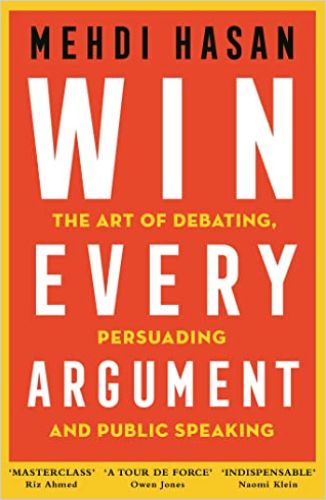Debates – around the supper table or the water cooler, in town halls and school board meetings, in the halls of Congress and on cable TV – are shaping Americans’ lives, families, communities and democracy itself for better or worse. In an entertaining and pragmatic guide, veteran debater and journalist Mehdi Hasan teaches how to state your case with power and boost your influence when it matters most.

How to Dominate Debates
Journalist Mehdi Hasan’s guide to winning debates and arguments opens with a story from ancient Greece. During the Peloponnesian War, the village of Mytilene rebelled against Athenian rule but failed in its attempt to gain autonomy. The authorities in Athens decided on a harsh punishment: death for all Mytilene’s men and slavery for the women and children. Authorities sent a ship to carry the orders to the general of the occupying forces.
But while the ship was en route, a discussion arose among the elite of Athens; some felt the punishment had been too harsh. A formal debate ensued. Cleon, a general, argued for adhering to the severe punishment, and a moderate political leader, Diodotus, argued for leniency. Against Cleon’s raging calls for death, Diodotus responded eloquently, with calm and expedient logic. Diodotus won the day, and a second ship was sent to Mytilene – arriving just in time to save the city.
It is better to debate a question without settling it than to settle a question without debating it. 19th-century essayist Joseph Joubert
Few arguments will carry such weighty consequences, but Hasan’s point remains: Debate matters. Whether it happens in the boardroom or the bedroom, around the Thanksgiving table or in a town hall, discussions of matters of personal or political import shape families, communities, relationships and the lives of all those involved. And because debates matter, winning them matters. Hasan sets out to teach his readers how.
Hasan brings significant personal experience to his subject. He has served as an op-ed columnist and TV pundit in the UK, a political interviewer for Al Jazeera English, and an anchor for MSNBC. His interlocutors have included heads of state, military leaders, spy chiefs and celebrities. Debates are vital to a healthy democracy, Hasan says, yet many people shy away from heated arguments. And for any professional, a flair for public speaking and debate, along with confidence in stating a case, represent soft skills vital for career advancement. Hasan promises his research-backed tactics can make the reader “a champion of debate, a master of rhetoric, a winner in the art of argument.”
Audience First
Hasan’s overarching message runs contrary to much rhetorical advice, which tends to focus on tactics. For Hasan, the way to win listeners over is, above all, to put them first. In any debate, he says, never ignore your audience or take them for granted. Your listeners are your judge and jury – the people whose minds and hearts you’re attempting to persuade. You must know, understand and speak to them.
Hasan recommends three tactics to reach and influence listeners: First, get to know them by doing your homework prior to any debate or presentation. Familiarity with your audience’s attitudes and values will enable you to prepare remarks that resonate. For example, use an appropriate quote from Barack Obama if you’re addressing a liberal audience, and one from Ronald Reagan if you’re presenting to a conservative group. Play to the crowd, without changing the gist of your argument.
Designing a presentation without an audience in mind is like writing a love letter and addressing it ‘to whom it may concern’.Designer Ken Haemer
Second, capture your listeners’ attention immediately. Hasan cites a Microsoft study that found concentration wanes after just eight seconds, on average. Grab those initial seconds of attentiveness by starting strong, Hasan says. Use an opening that’s unexpected, provocative or even contrary. For example, entrepreneur Ric Elias, CEO and co-founder of Red Ventures, began his 2011 TED Talk, “Three Things I Learned While My Plane Crashed,” as follows: “Imagine a big explosion as you climb through 3,000 feet. Imagine a plane full of smoke…It sounds scary. Well, I had a unique seat that day. I was sitting in 1D.”
Third, Hasan says, you must connect with your listeners and get them on your side. Look around the room and make eye contact with audience members to ensure they feel seen. Praise your audience in a way that exhibits your familiarity with how they see themselves or where they live. Be authentic, and tell personal stories that you feel comfortable sharing.
Leverage Emotion
As the above guidelines suggest, Hasan’s recommended approach centers on emotion more than factual arguments. To Hasan, facts are important – and you should be prepared to back up any statements you make with proof – but facts alone don’t win arguments or change minds. Indeed, most listeners struggle to retain factual information, he says. Arguments that resonate on an emotional level are more persuasive. Humans may believe they are rational decision-makers, but neuroscience research suggests that emotions truly govern their decisions.
The heart steers the head. And if it’s heart versus head, I promise you, pure logic is losing nine times out of ten.Mehdi Hasan
Hasan offers three chief methods to strengthen your arguments by injecting emotion into your delivery: Harness the power of storytelling, a powerful tactic for aligning listeners’ thinking with your own; employ provocative language, which touches their deep feelings and appeals to shared values; and reveal your own passion, which helps your audience connect with you authentically.
Fight Fair
Hasan’s points on audience and emotion form the heart of his recommendations. In the balance of the book, he goes on to cover more familiar rhetorical fare, although he offers a fresh perspective on the employment of these devices, reflecting his emphasis on winning and considering the audience first.
For example, with regard to the use of ad hominem attacks – arguments that seek to weaken an opponent’s position by attacking his or her personal qualities – Hasan grants that people’s personal qualities shouldn’t matter, and only the logical or factual nature of a message should count. But he pragmatically points out that these arguments do have power because, in reality, people believe speakers they deem credible. Thus, attacking an opponent’s credibility can exert a powerful influence on an audience’s views.
Both practical and passionate, Hasan delivers a useful and entertaining introduction to debate and public speaking that appeals simultaneously to civic responsibility and the pursuit of personal power. Win Every Argument will give you the tools to exert influence at work, at home and in the public sphere, along with an awareness of the ethical obligation to use your new powers wisely.













